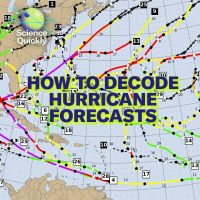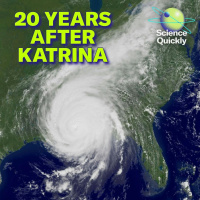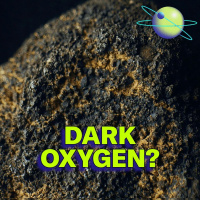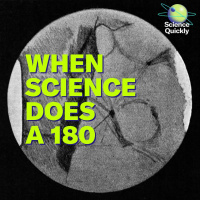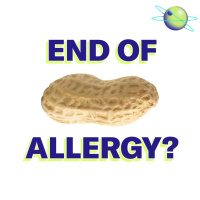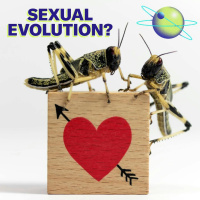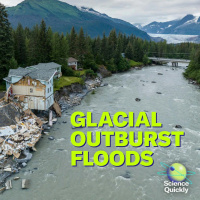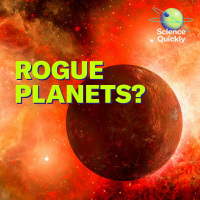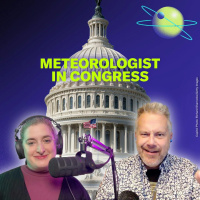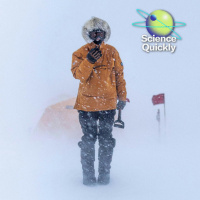Sinopsis
Leading science journalists provide a daily minute commentary on some of the most interesting developments in the world of science. For a full-length, weekly podcast you can subscribe to Science Talk: The Podcast of Scientific American . To view all of our archived podcasts please go to www.scientificamerican.com/podcast
Episodios
-
Hurricane Forecasting 101
03/09/2025 Duración: 13minMeteorologists have made big strides in predicting hurricane paths, but many people still misinterpret the forecast maps. In this episode, senior news editor for sustainability Andrea Thompson joins host Rachel Feltman to unpack what those maps actually show—and why staying informed as a storm evolves is more important than ever. Recommended Reading How to Decode a Hurricane Forecast Join the #SciAmInTheWild photography challenge for a chance to win a one-year Unlimited subscription to Scientific American—plus an exclusive bundle of gadgets and gear to level up your next adventure. See the rules for entry here. E-mail us at sciencequickly@sciam.com if you have any questions, comments or ideas for stories we should cover! Discover something new every day: subscribe to Scientific American and sign up for Today in Science, our daily newsletter. Science Quickly is produced by Rachel Feltman, Fonda Mwangi, Kelso Harper and Jeff DelViscio. This episode was edited by Alex Sugiura. Shayna Posses and Aaron S
-
Katrina Was Predicted: Revisiting Warning Signs 20 Years Later
29/08/2025 Duración: 23minTwenty years after Hurricane Katrina devastated New Orleans, Scientific American revisits the storm’s tragic legacy and the scientific warnings that went unheeded. Senior editor Mark Fischetti shares his experience reporting on the city’s vulnerability years before the levees broke, and our senior Earth and environment editor Andrea Thompson reflects on how hurricane preparedness has changed since. Recommended Reading See the Restore the Mississippi River Delta website Drowning New Orleans Protecting New Orleans “They Saw It Coming,” by Mark Fischetti, in the New York Times; September 2, 2005 Join the #SciAmInTheWild photography challenge for a chance to win a one-year Unlimited subscription to Scientific American—plus an exclusive bundle of gadgets and gear to level up your next adventure. See the rules for entry here. E-mail us at sciencequickly@sciam.com if you have any questions, comments or ideas for stories we should cover! Discover something new every day: subscribe to Scientific American
-
The Deep Sea’s Mysterious Oxygen Source
27/08/2025 Duración: 18minTrillions of potato-sized rocks scattered across the deep ocean floor are rich in metals such as cobalt and copper—making them a target for mining companies eager to fuel the clean-energy transition. But recent research suggests these rocks may also be supporting marine life in ways scientists are only beginning to understand. In this episode, scientist and journalist Clare Fieseler and filmmaker Jason Jaacks join host Rachel Feltman to explore the surprising science behind these deep-sea rocks and the environmental stakes of harvesting them. Recommended Reading A ‘Dark Oxygen’ Mystery Is Unfolding at the Ocean Bottom—But Undersea Mining Giants May Soon Move In Join the #SciAmInTheWild photography challenge for a chance to win a one-year Unlimited subscription to Scientific American—plus an exclusive bundle of gadgets and gear to level up your next adventure. See the rules for entry here. E-mail us at sciencequickly@sciam.com if you have any questions, comments or ideas for stories we should cover! Disco
-
Science’s Greatest 180s
25/08/2025 Duración: 08minScience doesn’t always get it right the first time—and that’s part of the journey. In this anniversary episode, we explore how ideas about nerve damage, sustainable materials and alien life have done a full 180. Recommended Reading Celebrating 180 Years of Scientific American 180 Years of Standing Up for Science How Scientists Finally Learned That Nerves Regrow Proof That Adult Brains Make New Neurons Settles Scientific Controversy Plastics Started as a Sustainability Solution. What Went Wrong? The Search for Extraterrestrial Life Is a Roller Coaster of Hope and Disappointment Join the #SciAmInTheWild photography challenge for a chance to win a one-year Unlimited subscription to Scientific American—plus an exclusive bundle of gadgets and gear to level up your next adventure. See the rules for entry here. Email us at sciencequickly@sciam.com if you have any questions, comments or ideas for stories we should cover! Discover something new everyday: subscribe to Scientific American and sign up for Today
-
Could Peanut Allergies Be Cured?
22/08/2025 Duración: 20minPeanut allergies have surged dramatically in recent decades, and scientists are still working to understand why. In this episode, journalist Maryn Mckenna, who recently authored an article on the subject, and host Rachel Feltman explore the latest research on causes, treatments and prevention strategies. Recommended Reading Can Peanut Allergies Be Cured? Join the #SciAmInTheWild photography challenge for a chance to win a one-year Unlimited subscription to Scientific American—plus an exclusive bundle of gadgets and gear to level up your next adventure. See the rules for entry here. Email us at sciencequickly@sciam.com if you have any questions, comments or ideas for stories we should cover! Discover something new everyday: subscribe to Scientific American and sign up for Today in Science, our daily newsletter. Science Quickly is produced by Rachel Feltman, Fonda Mwangi, Kelso Harper and Jeff DelViscio. This episode was edited by Alex Sugiura. Shayna Posses and Aaron Shattuck fact-check the show. The t
-
Nature’s Sexual Spectrum Breaks the Binary
20/08/2025 Duración: 12minBiologist Nathan Lents joins Science Quickly to explore the vast sexual diversity found across the animal kingdom. His new book, The Sexual Evolution: How 500 Million Years of Sex, Gender, and Mating Shape Modern Relationships, challenges the binary framework that has long shaped biological research, arguing for a more accurate and inclusive view of sex and gender. From alternative reproductive strategies to overlapping traits, this episode reveals how nature defies neat categories—and why science should, too. Recommended Reading Here’s Why Human Sex Is Not Binary This Backyard Bird Has a Lot to Teach Us about Sex Variability The Sexual Evolution: How 500 Million Years of Sex, Gender, and Mating Shape Modern Relationships, by Nathan Lents. Mariner Books, 2025 Join the #SciAmInTheWild photography challenge for a chance to win a one-year Unlimited subscription to Scientific American—plus an exclusive bundle of gadgets and gear to level up your next adventure. See the rules for entry here. E-mail us at sci
-
Chikungunya Outbreak, Glacial Outbursts and a New Human Ancestor
18/08/2025 Duración: 10minThe chikungunya virus is rapidly spreading in China. Could it make its way to the U.S.? Meanwhile in Alaska a glacial lake outburst flooded the nearby Mendenhall River to record levels. And in Ethiopia fossilized teeth reveal a new species of Australopithecus—one that possibly lived alongside one of our closer cousins in theHomo genus—shedding light on human evolution. Recommended reading: How the New Chikungunya Virus Outbreak in China Could Reach the U.S. Why Glacial Lake Outbursts like the One in Alaska May Happen More Often Entirely New Species of Human Ancestor Discovered Join the #SciAmInTheWild photography challenge for a chance to win a one-year Unlimited subscription to Scientific American—plus an exclusive bundle of gadgets and gear to level up your next adventure. See the rules for entry here. Email us at sciencequickly@sciam.com if you have any questions, comments or ideas for stories we should cover! Discover something new everyday: subscribe to Scientific American and sign up for To
-
Dinner with King Tut Explores the Wild World of Experimental Archaeology
15/08/2025 Duración: 14minScience writer Sam Kean joins Science Quickly to explore the hands-on world of experimental archaeology—where researchers don’t just study the past; they rebuild it. From launching medieval catapults to performing ancient brain surgery with stone tools, Kean shares his firsthand experiences with re-creating the techniques and technologies of long-lost civilizations. His latest book, Dinner with King Tut, dives deep into these wild experiments and the things they have revealed about how our ancestors lived, worked and ate. Recommended reading: Scientists Used Prehistoric Tools to Build a Canoe, Then Paddled Across 140 Miles from Taiwan to Japan Denmark’s Radical Archaeology Experiment Is Paying Off in Gold and Knowledge Dinner with King Tut, by Sam Kean; Little, Brown, 2025 Sam Kean’s website Join the #SciAmInTheWild photography challenge for a chance to win a one-year Unlimited subscription to Scientific American—plus an exclusive bundle of gadgets and gear to level up your next adventure. See the
-
Living Longer, Aging Smarter [Sponsored]
14/08/2025 Duración: 08minLife expectancy has risen dramatically since 1900, reshaping how we understand aging. Scientists now view skin not just as a surface indicator, but as a biological marker of systemic health. In this podcast episode, Scientific American Custom Media explores how longevity science is offering new insights into vitality across the lifespan. Learn more about your ad choices. Visit megaphone.fm/adchoices
-
Condoms and Vasectomies Aren’t Enough—Is a Male Birth Control Pill Next?
13/08/2025 Duración: 09minIn this episode, host Rachel Feltman speaks with freelance science journalist Hannah Seo about a promising new development in male contraception: a hormone-free birth control pill that reversibly stops sperm production has just passed its first human safety trial. Seo explains how the drug works, what makes it different from hormone-based methods and where it stands in clinical development. Recommended reading: First Hormone-Free Male Birth Control Pill Shown Safe in Early Human Trial Male Birth Control Is in Development, but Barriers Still Stand in the Way “Safety and Pharmacokinetics of the Non-Hormonal Male Contraceptive YCT-529,” by Nadja Mannowetz et al., in Communications Medicine, Vol. 5, Article No. 279. Published online July 22, 2025 Email us at sciencequickly@sciam.com if you have any questions, comments or ideas for stories we should cover! Discover something new every day: subscribe to Scientific American and sign up for our daily newsletter. Science Quickly is produced by Rachel Fel
-
Cosmic Discoveries Soar as Earthly Health Decisions Stir Alarm
11/08/2025 Duración: 09minRogue planets drifting through space might be forming their own planetary systems. NASA’s Europa Clipper mission has completed a key radar test ahead of its journey to study Jupiter’s icy moon. Plus, a major shift in U.S. health research funding occurs as Secretary of Health and Human Services Robert F. Kennedy, Jr., cancels nearly $500 million in funding for mRNA vaccine development. E-mail us at sciencequickly@sciam.com if you have any questions, comments or ideas for stories we should cover! Discover something new everyday: subscribe to Scientific American and sign up for our daily newsletter. Science Quickly is produced by Rachel Feltman, Fonda Mwangi, Kelso Harper and Jeff DelViscio. This episode was edited by Alex Sugiura. Shayna Posses and Aaron Shattuck fact-check our show. Our theme music was composed by Dominic Smith. Learn more about your ad choices. Visit megaphone.fm/adchoices
-
Climate Science Gets a Seat in Congress with Eric Sorensen
08/08/2025 Duración: 17minRepresentative Eric Sorensen of Illinois brings his background as a meteorologist to the halls of Congress, advocating for science-based policy amid intensifying climate threats. In this episode, he shares how personal experiences with extreme weather shaped his career and why protecting agencies like the National Weather Service is more urgent than ever. Sorensen also discusses the political challenges of defending climate science and makes a compelling case for why more scientists should enter public office. Recommended reading: Higher Bills, Hotter Planet: What Trump’s Megabill Means for You Texas Failed to Spend Millions in Federal Aid for Flood Protection Flood Forecasts Could Worsen as Trump’s NWS Cuts Take Hold E-mail us at sciencequickly@sciam.com if you have any questions, comments or ideas for stories we should cover! Discover something new everyday: subscribe to Scientific American and sign up for our daily newsletter. Science Quickly is produced by Rachel Feltman, Fonda Mwangi, Kelso Harpe
-
Former NASA Leaders Are Sounding the Alarm on Budget Cuts
06/08/2025 Duración: 16minThe White House has proposed sharp cuts to NASA’s science budget, potentially reducing it to historic lows not seen since the early Apollo era. Beyond space exploration, NASA’s work influences daily life—from accurate weather forecasting to essential climate data for agriculture. Concerned by the effects of these cuts, all living former NASA science chiefs have united in warning of dire consequences for U.S. leadership in science. In this episode, Scientific American senior editor Lee Billings speaks with host Rachel Feltman to discuss why this moment feels especially urgent and what one former NASA science chief thinks about it. Recommended reading: White House Budget Plan Would Devastate U.S. Space Science U.S. Secretary of the Interior: Satellites Will Help Us Fight Climate Change The Trump-Musk Fight Could Have Huge Consequences for U.S. Space Programs Email us at sciencequickly@sciam.com if you have any questions, comments or ideas for stories we should cover! Discover something new everyday: s
-
Russia’s Earthquake, Wonders of Walking and Surprising Plant Genetics
04/08/2025 Duración: 11minHost Rachel Feltman talks with Andrea Thompson, Scientific American’s senior sustainability editor, to discuss the massive Russian earthquake and the reason it produced such relatively minor tsunami waves. Plus, we discuss the lowdown on the Environmental Protection Agency’s move to repeal of the “endangerment finding,” the advantages of a brisk stroll and an ancient linkup that led to a farmer’s market favorite. Recommended reading: Tsunami Warnings Issued after Magnitude 8.8 Earthquake Strikes off Russian Coast Russia’s 8.8 Earthquake Is One of the Strongest Ever Recorded Why the Russian Earthquake Didn’t Cause a Huge Tsunami The Potato’s Mysterious Family Tree Revealed—And It Includes Tomatoes E-mail us at sciencequickly@sciam.com if you have any questions, comments or ideas for stories we should cover! Discover something new every day: subscribe to Scientific American and sign up for Today in Science, our daily newsletter. Science Quickly is produced by Rachel Feltman, Fonda Mwangi, Kelso Harper
-
Is AI Conscious? Claude 4 Raises the Question
01/08/2025 Duración: 22minHost Rachel Feltman talks with Deni Ellis Béchard, Scientific American’s senior tech reporter, about his recent exchange with Claude 4, an artificial intelligence chatbot that seemed to suggest it might be conscious. They unpack what that moment reveals about the state of AI, why it matters and how technology is shifting. Recommended reading: Can a Chatbot be Conscious? Inside Anthropic’s Interpretability Research on Claude 4 New Grok 4 Takes on ‘Humanity’s Last Exam’ as the AI Race Heats Up E-mail us at sciencequickly@sciam.com if you have any questions, comments or ideas for stories we should cover! Discover something new every day: subscribe to Scientific American and sign up for Today in Science, our daily newsletter. Science Quickly is produced by Rachel Feltman, Fonda Mwangi, Kelso Harper and Jeff DelViscio. This episode was edited by Alex Sugiura. Shayna Posses and Aaron Shattuck fact-check our show. Our theme music was composed by Dominic Smith. Learn more about your ad choices. Visit meg
-
Your Guide to Summer’s Extreme Weather, from Corn Sweat to Flash Floods
30/07/2025 Duración: 09minThe summer of 2025 has been a doozy in the U.S., with extreme weather across the country. Flash flooding caused destruction and death in Texas. Corn sweat made a heat wave in the eastern half of the U.S. worse in the Midwest. Senior editor for sustainability Andrea Thompson takes us through these extreme weather events. Recommended reading: Why Did Waters Rise So Quickly in the Texas Flash Floods? https://www.scientificamerican.com/article/why-did-texas-flash-flood-waters-rise-so-quickly/ ‘Corn Sweat’ Is Making This Heat Wave Even Worse https://www.scientificamerican.com/article/humidity-from-corn-sweat-intensifies-extreme-heat-wave-in-midwest-u-s/ E-mail us at sciencequickly@sciam.com if you have any questions, comments or ideas for stories we should cover! Discover something new every day: subscribe to Scientific American and sign up for Today in Science, our daily newsletter. Science Quickly is produced by Rachel Feltman, Fonda Mwangi, Kelso Harper and Jeff DelViscio. This episode was hosted
-
Summer Meteor Showers, Short Summer Days and Ancient Arthropods
28/07/2025 Duración: 08minIf last Tuesday seemed to fly by, you can blame the rotation of Earth. Try to look up this week to see the Southern Delta Aquariids and the Alpha Capricornids meteor showers. Plus, we discuss FEMA cuts and ancient arthropods. Recommended reading: Texas Failed to Spend Millions in Federal Aid for Flood Protection https://www.scientificamerican.com/article/texas-failed-to-spend-federal-aid-for-flood-disaster-protection/ Leap Seconds May Be Abandoned by the World’s Timekeepers https://www.scientificamerican.com/article/leap-seconds-may-be-abandoned-by-the-worlds-timekeepers/ E-mail us at sciencequickly@sciam.com if you have any questions, comments or ideas for stories we should cover! Discover something new every day: subscribe to Scientific American and sign up for Today in Science, our daily newsletter. Science Quickly is produced by Rachel Feltman, Fonda Mwangi, Kelso Harper and Jeff DelViscio. This episode was hosted by Rachel Feltman. Our show is fact-checked by Shayna Posses and Aaron Shattu
-
Greenland’s Ice Sheet Is at Risk—And So Are We
25/07/2025 Duración: 22minChief multimedia editor Jeffery DelViscio ventured to Greenland for a month to learn from the scientists studying the country’s ice sheet. He speaks with host Rachel Feltman about his time in the field and his takeaways from conversations with climate scientists. This story was supported by a grant from the Pulitzer Center. This story was made possible through the assistance of the U.S. National Science Foundation Office of Polar Programs. Read the cover story and see stunning pictures from DelViscio’s time on the ice: What Greenland’s Ancient Past Reveals about Its Fragile Future https://www.scientificamerican.com/article/greenlands-ice-sheet-collapse-could-be-closer-than-we-think/ E-mail us at sciencequickly@sciam.com if you have any questions, comments or ideas for stories we should cover! Discover something new every day: subscribe to Scientific American and sign up for Today in Science, our daily newsletter. Science Quickly is produced by Rachel Feltman, Fonda Mwangi, Kelso Harper and Jeff DelVi
-
What to Read on the Beach This Summer
23/07/2025 Duración: 10minScientific American has been reading, reviewing and recommending books for more than 100 years. These days Brianne Kane, our resident reader, is in charge of organizing our book recommendation lists to help science-minded people find the perfect read, including novels. She joins fellow book nerd Rachel Feltman to talk about the nonfiction and fiction books she’s recommending this summer—and gives a preview of our end-of-year lists. Recommended reading: See The 4 Books Scientific American Loved Reading in June https://www.scientificamerican.com/article/4-nonfiction-books-scientific-american-recommended-in-june/ Your Garbage Has a ‘Wild Afterlife’ on the International Black Market https://www.scientificamerican.com/article/waste-wars-tracks-the-wild-afterlife-of-garbage-on-an-international-black/ Get more great summer reads every week: sign up for Today in Science, our daily newsletter. Discover something new every day: subscribe to Scientific American. E-mail us at sciencequickly@sciam.com if you ha
-
Time Travel to Tide Pool 101 from Our July 1925 Issue
21/07/2025 Duración: 08minTime travel to an introduction to tide pools, the start of commercial air travel and an intercontinental aviation museum dispute. Host Rachel Feltman is taking a look at a 1925 issue of Scientific American for this archival episode. If you don’t find the past to be a blast, don’t worry! We’ll be back to our regular schedule of science news, deep dives and editor picks next week. In the meantime, read some recent coverage of marine marvels and flight! Recommended reading: Yes, Airline Flights Are Getting Bumpier: Here’s Why https://www.scientificamerican.com/article/yes-airline-flights-are-getting-bumpier-heres-why/ See the Lush Kelp Forests Scientists Are Fighting for as Oceans Warm https://www.scientificamerican.com/article/as-oceans-warm-scientists-fight-to-save-lush-kelp-forests/ E-mail us at sciencequickly@sciam.com if you have any questions, comments or ideas for stories we should cover! Discover something new every day: subscribe to Scientific American and sign up for Today in Science, our dai

